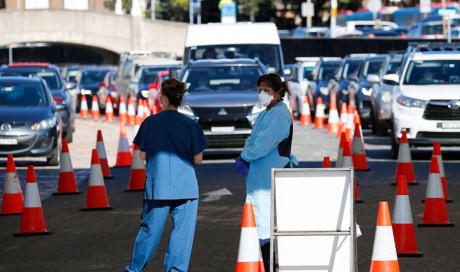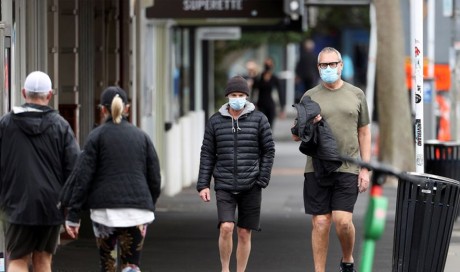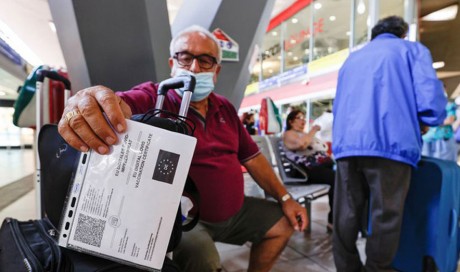Berlin, Germany - Just last week, Europe had recorded fewer than 50 cases of the new coronavirus across seven countries, with each directly traceable back to China.
Now more than 350 cases have been confirmed, mostly in northern Italy following a major outbreak over the weekend which sent alarm bells ringing around the continent, as health authorities and experts debate what measures, if any, will halt the further spread of the disease.
At least 11 people have died from the virus in Italy, as the government has placed about a dozen towns in the country's industrial and financial heartlands of Lombardy and Veneto under total lockdown - with schools shuttered, public events banned and local transport closed but confirmed cases linked to the region have already appeared in France, Austria, Spain, Greece and Croatia.
The European Centre for Disease Control (ECDC) has said there remains a moderate to high chance of similar coronavirus clusters to those in Italy, whose origins remain unknown, occurring elsewhere in Europe.
"The fact that we're having deaths and we're seeing so many cases [in Italy] is an indication that there was a lot of spread going on before the news broke," Andy Tatem, a geography professor at the University of Southampton, told Al Jazeera.
But despite the sudden jump in cases, significant investments made by European nations in public healthcare, as well as overarching coordination from the ECDC, have made the continent more resilient to viral outbreaks compared with much of the world, he added.
"Because of the heightened alert, and [European] countries getting more and more prepared because of what's happening there, we might not see something as major as Italy again."
Health ministers in nearby France, Germany and Greece have suggested they could order similarly stringent measures should their own countries develop large outbreaks, but for now European health authorities have called for a proportionate response to the coronavirus threat, and stepped up preparations in anticipation of further infections.
"What the different countries do will be driven by their previous experience and capacity in public health, and that does vary from country to country, even within the European Union," said Paul Hunter, a professor at Norwich Medical School.
France, which at the time of publication had recorded 17 cases and two deaths, has prepared 108 hospitals, with at least one in every region, to admit, isolate and care for coronavirus patients. It has also boosted testing capacity in hospitals in Paris and Marseille to more than 1,400 per day, according to Health Minister Olivier Veran.
Meanwhile, Germany's health ministry has allocated 23 million euros ($25m) to its coronavirus response and said it was "well prepared" for new cases, noting its advanced warning and reporting system and a coordinated network of specialist clinics. Two new cases have been reported on Wednesday by local media in the states of North Rhine-Westphalia and Baden-Wurttemberg, bringing the total to 18, but the overall risk in Germany low, according to the Robert Koch Institute, a government research agency.
Both nations have also made bulk orders for surgical masks and other protective equipment for health workers, amid worldwide shortages which the World Health Organization (WHO) has blamed on unnecessary stockpiling by the public.
Switzerland has tightened measures at border crossings with neighbouring Italy, as authorities improve testing lab capacity and widen awareness campaigns. The interior ministry has announced tests will be made available to all people exhibiting flu-like symptoms.
In the United Kingdom, a number of schools have closed for the week over concerns pupils may have contracted COVID-19 - its official name, from COrona VIrus 2019 - while skiing in Italy during half-term, the Press Association reports.
However, health officials have said only those showing symptoms should self-isolate, and that the country's risk level remains low. All airports with flight links to China are under close monitoring, and public health officials have been deployed to London Heathrow, the country's busiest airport - and the second-busiest airport in the world, behind Dubai.
At present, European health services are pursuing a strategy of containment. In practice, this means identifying infections and tracing their origin, so that any people who have come in contact with the disease can be tested, isolated and treated as necessary.
Citizens are taking measures to protect themselves after the new coronavirus was confirmed in the Spanish city of Barcelona.
The number of cases across the continent is currently manageable, say experts, but the possibility of a large number of yet unknown cases, or a recurrence of what has happened in Italy, could see healthcare infrastructure put under serious pressure.
"[The tipping point is] when you have several thousands of cases and you cannot identify the trail of infection," said Bharat Pankhania, an expert in disease control at the University of Exeter.
"So it could be we are getting outbreaks in village A and village B, but it's unexplained or difficult to identify how they got it, who brought it in, who's the case and who's the contact - and your precision now has gone down rather than up."
If the number of cases does eventually reach such a threshold, existing containment measures will become ineffective. Instead, resources would then be allocated to mitigating the effects of the virus by increasing hospital capacity, safeguarding front-line health workers and potentially limiting travel and public gatherings.
"[In that scenario] we'll have to move from the idea of containing individual cases to making sure that we can effectively support very ill people with the disease, and actually try and protect the most vulnerable in society, which are people with other diseases and the elderly," said Hunter.
"That might move away from a containment isolation, which we've been doing, to a protective isolation where elderly people and people with serious diseases are encouraged to stay in, out of public, until the main wave has passed."
Europe's Schengen Area, which operates open borders without passport or customs checks between its 26 member states, does allow for the temporary suspension of this arrangement in exceptional circumstances where a country's security is at risk.
On Sunday, Austria briefly halted train services with Italy while a number of passengers were tested for the virus, but travel restrictions have been minimal and European leaders have poured water on the idea of expanding them.
France announces second coronavirus death
"We agreed to keep borders open. Closing borders would be a disproportionate and ineffective measure at this time," Italian Health Minister Roberto Speranza told reporters following a meeting with other European health ministers in Rome on Tuesday.
Calls for tighter borders from a number of far-right figures, including Italy's Matteo Salvini and France's Marine Le Pen have been ignored.
The reinforcement of border restrictions would have a devastating effect on local and national economies that have developed around seamless travel, say public health experts, causing the usual free flow of goods and people to come to a shuddering halt.
To take just one example of Schengen dependency, Italy's border with Switzerland sees almost 70,000 commuters cross each day, and is a significant European crossing point for road and rail haulage, which would be thrown into chaos if checks were put in place.
Isolating specific areas - as in northern Italy and China's Hubei province - can be effective in limiting the spread of illness, but there is less evidence that strengthening national boundaries is productive.
"Closing borders for infectious diseases rarely works. Most of these infections will get through," said Hunter, adding that screening measures at customs checks and airports have been so far ineffective at detecting COVID-19.
Quarantine envelops contacts of Austria's first coronavirus case
Even in best-case scenarios, screening will fail to detect more than half of infected people, found a study published on Monday by researchers in the UK and the US. A majority of missed cases were "fundamentally undetectable", because carriers had not developed symptoms or were not aware they were exposed to the virus.
Ireland's rugby match against Italy, scheduled for March 7, was postponed on Wednesday, in the latest sign that events involving large numbers of attendees travelling internationally may be called off until the coronavirus threat has diminished.
A number of important events have already been postponed or cancelled across Europe, including several fixtures in Italy's Serie A football league, Milan's MIDO eyewear trade show, Barcelona's Mobile World Congress and Frankfurt's Light + Building design fair.
"The biggest types of spread events are mass gatherings and mass movements of people - that's part of the reason why it started with Chinese New Year, and we're now seeing the religious pilgrimage in Iran as potentially a major source of spread," said Tatem.
"It seems like that makes a lot of sense to ban those events if it looks like things are becoming more pandemic-like."
Share This Post















